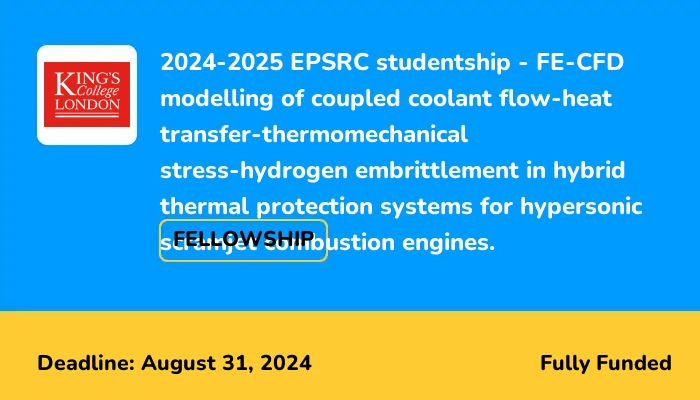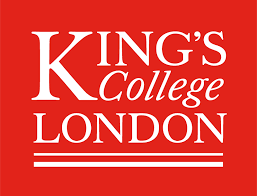 Menu
Menu
Published: 14 Aug 2024 406 views

You will simulate the coupled aerothermal-mechanical performance of passive-active-regenerative cooling (PARC) systems for hypersonic scramjet combustion engines. Funding is provided by the UK Engineering and Physical Sciences Research Council (EPSRC).
PARC systems are crucial for increasing the Mach number, the survivability, and the manoeuvrability of hypersonic vehicles and this project could enable UK to manufacture supreme ramjet-scramjet1 and rotary detonation engines2, by accommodating extreme aerothermal heating with minimum fuel/weight on board. PARC systems combine an outer passive layer (ceramic) and an inner active-regenerative layer (refractory/alloy metal) where liquid hydrogen runs through cooling channels before being injected for combustion3.
You will build on our work on conjugate Finite Element (FE)-Computational Fluid Dynamics (CFD) modelling of transpiration cooling systems for gas turbine blades3-4 to deliver new cutting-edge coupled heat transfer-stress FE-CFD simulations for PARC systems in real hypersonic engine environments. You will explore the coupled design challenge associated with hydrogen coolant flow5, thermomechanical stresses3-5, and hydrogen diffusion-embrittlement6 of ultra-high temperature materials. Outcomes of this project are directly transferable to a range of emerging technologies, including hydrogen fuelled gas turbines for civil aircraft5-6 and reusable rocket engines2. We seek to make substantial scientific contributions to the structural integrity design and failure assessment of materials and structures that experience extremely harsh thermomechanical loads in corrosive hydrogen environment.
King's College London was founded by King George IV and the Duke of Wellington (then Prime Minister) in 1829 as a university college in the tradition of the Church of England. It now welcomes staff and students of all faiths and beliefs. King's professors played a major part in nineteenth-century science and in extending higher education to women and working men through evening classes. The university has grown and developed through mergers with several institutions each with their own distinguished histories. These include: United Medical and Dental Schools of Guy's an... rea... continue reading

| Application Deadline | 31 Aug 2024 |
| Country to study | United Kingdom |
| School to study | King’s College London |
| Type | Fellowship |
| Course to study | View courses |
| Sponsor | King’s College London |
| Gender | Men and Women |
Funding is available for the student to enjoy a unique set of benefits and opportunities:
In addition to core training at their host organisation, all students are expected to participate in centralised training and cohort building activities which will be coordinated by the UK Hypersonic Technologies champion, based at the University of Oxford. You will hold/or at least a UK Bachelor Degree 2:1 in mechanical engineering, mechanics of materials, materials science, software engineering, mathematics or relevant subject. You must be a British, USA or Australian national (i.e. “a AUKUS national”) and obtain Baseline Personnel Security Standard (BPSS) security clearance carried out by an independent organisation. Informal enquiries may be addressed by email to Dr Christos Skamniotis, [email protected] .
The studentship will be funded at UKRI enhanced stipend rates paid for 4 years (for 2024/2025 this is £24,237 per annum, including London allowance). The studentship will also cover Fees for four years. The student will be expected to submit their thesis by the end of the 4th year and the writing up period is included within the funding period. The studentship will cover bench fees up to £4,500 per year.
You will hold/or at least a UK Bachelor Degree 2:1 in mechanical engineering, mechanics of materials, materials science, software engineering, mathematics or relevant subject. You must be a British, USA or Australian national (i.e. “a AUKUS national”) and obtain Baseline Personnel Security Standard (BPSS) security clearance carried out by an independent organisation.
To be considered for the position candidates must apply via King’s Apply online application system. Details are available at:
https://www.kcl.ac.uk/engineering/postgraduate/research-degrees
Please apply for Engineering Research (MPhil/PhD) and indicate your desired supervisor [Dr Christos Skamniotis], the project title and reference HypDTP02 in your application and all correspondence.
The selection process will involve a pre-selection on documents, if selected this will be followed by an invitation to an interview. If successful at the interview, an offer will be provided in due time.
Applicants should read the project description along with the cited references and then submit:
https://www.kcl.ac.uk/study/postgraduate-research/how-to-apply
In the funding section of the application (Award Scheme Code or Name) use “Engineering & Physical Sciences Research Council (EPSRC, www.epsrc.ac.uk)”
Interviews will take place on a rolling basis with an expected start date of October 2024. Applications will be considered in the order that they are received, the position will be considered filled when a suitable candidate has been identified.
For more details visit: King’s College London website.